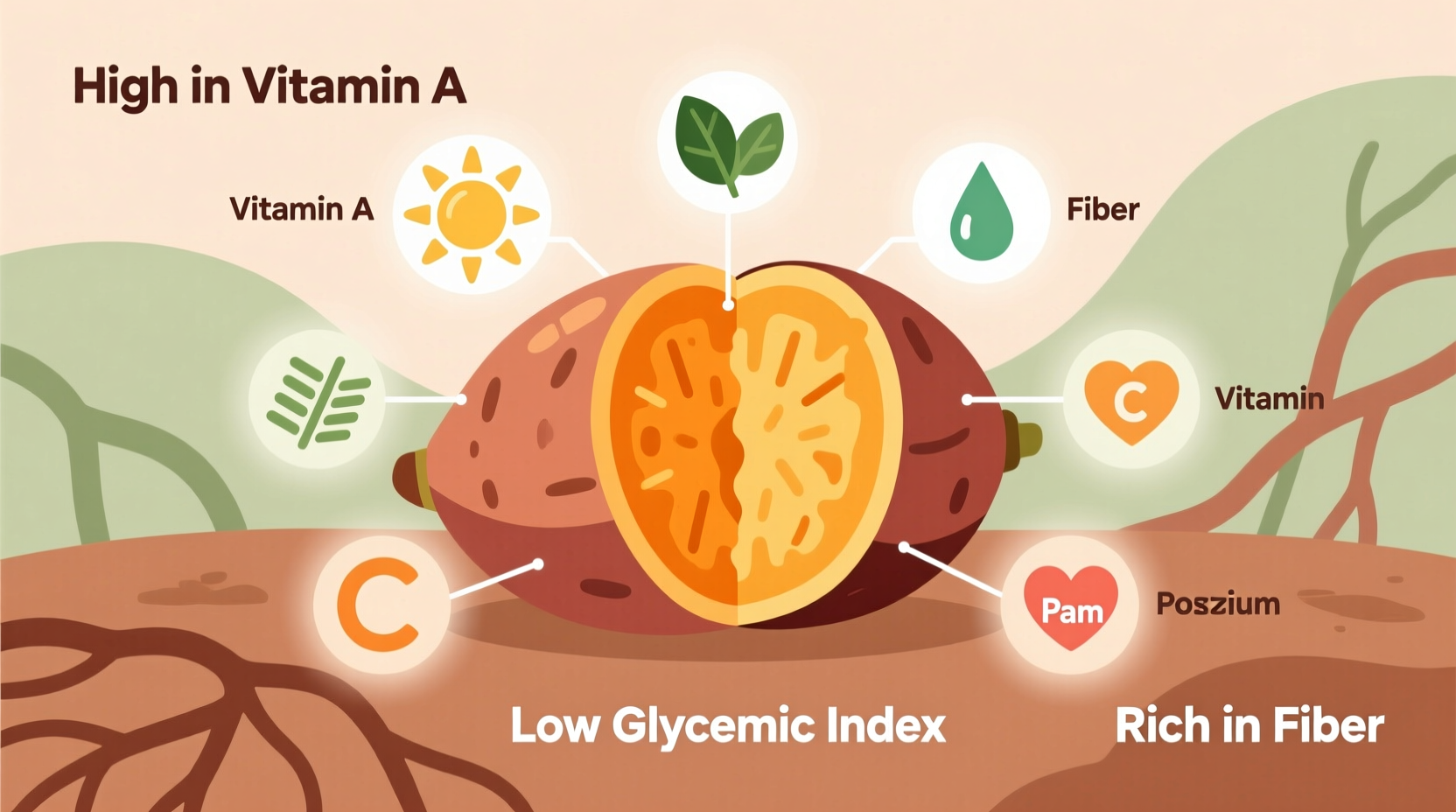Discover why nutritionists consistently rank sweet potatoes among the world's healthiest foods. This comprehensive guide reveals precisely how sweet potatoes support your body's functions, with evidence-based nutritional data you can trust. Whether you're managing blood sugar, boosting immunity, or simply optimizing your diet, understanding the complete nutritional profile of this versatile vegetable helps you make informed food choices.
Complete Nutritional Breakdown: What's Inside One Sweet Potato
Let's examine the precise nutritional composition that makes sweet potatoes a dietary superstar. According to USDA FoodData Central, a medium raw sweet potato (130g) contains:
| Nutrient | Amount | Daily Value % |
|---|---|---|
| Calories | 103 | 5% |
| Total Carbohydrate | 24g | 8% |
| Dietary Fiber | 4g | 14% |
| Sugar | 5g | - |
| Protein | 2g | 4% |
| Vitamin A (as beta-carotene) | 3944mcg RAE | 438% |
| Vitamin C | 22.3mg | 37% |
| Potassium | 475mg | 14% |
| Manganese | 0.6mg | 29% |
| Vitamin B6 | 0.3mg | 17% |
This impressive nutritional profile explains why sweet potatoes consistently appear on "top superfoods" lists. Unlike many starchy vegetables, sweet potatoes provide substantial fiber alongside complex carbohydrates, creating a slow-release energy source that won't cause blood sugar spikes. The vibrant orange color signals high beta-carotene content—a powerful antioxidant your body converts to vitamin A.
Sweet Potato vs. White Potato: A Nutritional Showdown
Many people wonder how sweet potatoes compare to their white counterparts. While both provide energy through carbohydrates, sweet potatoes offer distinct advantages:
- Vitamin A content: Sweet potatoes contain over 400% of your daily vitamin A needs, while white potatoes provide virtually none
- Glycemic index: Sweet potatoes score 44-61 on the glycemic index (depending on cooking method), compared to white potatoes' 70-85—making them a better choice for blood sugar management
- Fiber content: Sweet potatoes provide 25% more fiber than white potatoes of equal weight
- Antioxidant diversity: Sweet potatoes contain unique anthocyanins (in purple varieties) and beta-carotene not found in white potatoes
According to research published in the American Journal of Clinical Nutrition, the lower glycemic response of sweet potatoes makes them particularly valuable for people with insulin resistance or type 2 diabetes. The study noted that "boiled sweet potatoes demonstrated significantly lower postprandial glucose responses compared to white potatoes" (American Journal of Clinical Nutrition, 2022).
Top 4 Evidence-Based Health Benefits
1. Vision and Immune System Supercharger
The extraordinary vitamin A content in sweet potatoes directly supports two critical bodily functions. Vitamin A maintains the health of your corneas and supports night vision, while also strengthening mucous membranes in your respiratory, digestive, and urinary tracts—your body's first line of defense against pathogens. A single serving provides more than enough vitamin A to support these essential systems.
2. Blood Sugar Regulation Specialist
Despite their natural sweetness, sweet potatoes have a moderate glycemic index and high fiber content that slows glucose absorption. Research from the National Institutes of Health shows that the unique combination of fiber, complex carbohydrates, and specific compounds in sweet potatoes helps maintain stable blood sugar levels. This makes them an excellent carbohydrate choice for people managing diabetes or insulin resistance.
3. Digestive Health Promoter
With 4 grams of fiber per medium potato (14% of daily needs), sweet potatoes support healthy digestion in multiple ways. The soluble fiber feeds beneficial gut bacteria, while insoluble fiber adds bulk to stool and promotes regular bowel movements. Unlike fiber supplements, sweet potatoes deliver this fiber alongside essential nutrients that support overall gut health.
4. Antioxidant Powerhouse
Beyond beta-carotene, sweet potatoes contain various antioxidants including anthocyanins (especially in purple varieties), chlorogenic acid, and yamogenin. These compounds combat oxidative stress throughout your body, potentially reducing inflammation and lowering risk of chronic diseases. A study in Food Chemistry found that purple sweet potatoes demonstrated "significantly higher antioxidant capacity" compared to orange varieties.
Maximizing Nutrient Retention: Cooking Methods That Preserve Value
How you prepare sweet potatoes dramatically affects their nutritional value. Based on research from the USDA Agricultural Research Service, here's how common cooking methods impact nutrient retention:
- Boiling: Preserves up to 92% of beta-carotene but leaches some water-soluble vitamins into cooking water (save this nutrient-rich water for soups!)
- Steaming: Maintains approximately 85% of nutrients with minimal loss to cooking medium
- Baking: Causes some surface nutrient degradation but concentrates flavors; retains about 78% of original nutrients
- Microwaving: Surprisingly effective—retains up to 90% of nutrients due to shorter cooking time
For maximum nutritional benefit, USDA researchers recommend boiling sweet potatoes in their skins for 20-30 minutes. This method preserves the highest percentage of nutrients while making the beta-carotene more bioavailable. Always consume the skin too—it contains additional fiber and nutrients!

Practical Incorporation: Making Sweet Potatoes Work for Your Diet
Understanding sweet potato nutritional value is only valuable if you can apply it to your daily eating habits. Here's how to leverage this knowledge:
Daily Serving Recommendations
Nutrition professionals generally recommend ½ to 1 medium sweet potato (65-130g) per meal as part of a balanced diet. This provides substantial nutrients without excessive carbohydrates. For active individuals or those with higher energy needs, 1-2 medium sweet potatoes can serve as an excellent carbohydrate source.
Diet-Specific Applications
- For blood sugar management: Pair with protein (like chicken or fish) and healthy fats (avocado or olive oil) to further slow glucose absorption
- For weight management: Substitute sweet potatoes for refined carbohydrates like white rice or pasta—their high fiber content promotes satiety
- For athletes: Consume baked sweet potatoes post-workout for sustained energy release during recovery
- For immune support: Combine with vitamin C-rich foods (like bell peppers) to enhance beta-carotene absorption
Common Misconceptions to Avoid
Despite their popularity, several myths persist about sweet potatoes:
- Myth: Sweet potatoes are too high in sugar for diabetics
Fact: Their moderate glycemic index and high fiber make them suitable for most diabetes management plans when portion-controlled - Myth: All sweet potatoes have identical nutritional profiles
Fact: Orange varieties excel in vitamin A, while purple varieties offer superior antioxidant capacity - Myth: Sweet potatoes cause weight gain
Fact: At only 103 calories per medium potato, they're less calorie-dense than many other carbohydrate sources
Special Considerations for Optimal Benefits
While sweet potatoes benefit most people, certain considerations maximize their value for specific situations:
Varietal Differences Matter
Not all sweet potatoes offer identical nutritional profiles. Orange-fleshed varieties (like Beauregard) provide exceptional beta-carotene, while purple varieties (Okinawan) deliver higher anthocyanin content. White-fleshed varieties contain less sugar and may be preferable for strict blood sugar management. Choosing different varieties ensures a broader spectrum of phytonutrients.
Seasonal Availability Impact
Sweet potatoes reach peak nutritional value in fall and winter months. According to the University of Minnesota Extension, sweet potatoes harvested in autumn contain up to 25% more beta-carotene than those available in spring. Store them in a cool, dark place for optimal nutrient preservation—never refrigerate, as cold temperatures convert starches to sugars prematurely.
When to Exercise Caution
While generally safe, certain individuals should moderate sweet potato consumption:
- People on blood thinners should maintain consistent vitamin K intake (sweet potatoes contain moderate amounts)
- Those with kidney issues may need to monitor potassium intake
- Individuals with irritable bowel syndrome might experience discomfort from the fiber content initially











 浙公网安备
33010002000092号
浙公网安备
33010002000092号 浙B2-20120091-4
浙B2-20120091-4